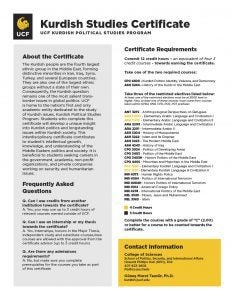Certificate in Kurdish Studies
The Kurdish people are the fourth largest ethnic group in the Middle East, forming distinctive minorities in Iran, Iraq, Syria, Turkey, and several European countries. They are also one of the largest ethnic groups without a state of their own. Consequently, the Kurdish question remains one of the most salient trans-border issues in global politics. UCF is home to the nation’s first and only academic entity dedicated to the study of Kurdish issues, Kurdish Political Studies Program. Students who complete this certificate will develop a unique insight into Kurdish politics and longstanding issues within Kurdish society. This interdisciplinary certificate contributes to student’s intellectual growth, knowledge, and understanding of the Middle Eastern politics and society. It is beneficial to students seeking careers in the government, academia, non-profit organizations, and private companies working on security and humanitarian issues.
Dr. Najmaldin Karim Research Fellowship in Kurdish Political Studies
The Kurdish Political Studies Program (KPSP) sponsors the Dr. Najmaldin Karim Fellowship for undergraduate students at UCF. The fellow is provided with resources conducive to educational and professional development and conduct a research project related to Kurdish politics, broadly defined, under the supervision of UCF faculty in the spring 2024. This research has the aim of producing a final paper that is worthy of publication such as an article, a conference paper, or a thesis. The fellowship aims to enrich the fellow’s academic credentials, providing a unique opportunity to gain in-depth insights about Kurdish politics through independent research. The research fellow will receive $500 for the semester. All financial aid rules and regulations apply.
Application Requirements
• A minimum GPA of 3.5
• A one-page letter of interest
• A writing sample (e.g., term paper submitted in a class)
• An unofficial copy of transcript
• A resume with two listed academic references
Students should submit their application to kurdish@ucf.edu. The application deadline for Spring 2024 is November 6, 2023. A committee of UCF faculty will select the fellow. The winner will be announced by late November.
Previous Fellows
Hannah Barnes – Spring 2022
Mohammed Al-Awwad – Fall 2021
Sophia Griement – Fall 2020
Alexi Sadaka – Spring 2020
Jenna Dovydaitis – Spring 2019
Margaret Morgan – Spring 2018
Kellan Ritter – Spring 2017
Best Article Award in Kurdish Studies
This award, sponsored by Kurdish Political Studies Program at the University of Central Florida, recognizes the best article in Kurdish Studies by a rising scholar during the previous calendar year. For this award cycle, articles published in 2022 will be considered. All articles published in English language peer-reviewed journals addressing questions and covering issues related to Kurdish politics, broadly defined, will be considered for the award. The award is open to all disciplines under social sciences and humanities. The primary author of the article needs to be an untenured scholar (graduate student, post-doc, independent scholar, assistant professor or equivalent) at the time of the publication. The winner will be awarded $800. The awardee will be announced by November 2023.
An electronic copy of the nominated article should be sent to kurdish@ucf.edu. Self-nominations are welcome.
Deadline for nominations: Friday, September 8, 2023
Award Committee:
- Tiffany Earley-Spadoni, University of Central Florida.
- Ekrem Karakoc. Binghamton University
- Nikola Mirilovic, University of Central Florida
Previous Awards
2022
Co-Winners
Özgür Sevgi Göral (2021).Waiting for the disappeared: waiting as a form of resilience and the limits of legal space in Turkey. Social Anthropology, 29(3), 800-815.
Nicola Degli Esposti (2021). The 2017 independence referendum and the political economy of Kurdish nationalism in Iraq. Third World Quarterly, 42(10), 2317-2333.
Honorable Mention
Vladimir Hamed-Troyansky (2021). Becoming Armenian: religious conversions in the late imperial South Caucasus. Comparative Studies in Society and History, 63(1), 242-272.
2021
First Prize Winner
Fırat Bozçalı (2020).Probabilistic borderwork: Oil smuggling, nonillegality, and techno‐legal politics in the Kurdish borderlands of Turkey. American Ethnologist, 47(1), 72-85.
Honorable Mention
Zozan Pehlivan. (2020). El Niño and the nomads: Global climate, local environment, and the crisis of pastoralism in late Ottoman Kurdistan.Journal of the Economic and Social History of the Orient, 63(3), 316-356.
2020
Co-Winners
Ahmad Mohammadpour and Kamal Soleimani. “Interrogating the tribal: the aporia of ‘tribalism’ in the sociological study of the Middle East,” British Journal of Sociology 70(5) (2019), 1799-1824.
Marlene Schäfers. “Archived Voices, Acoustic Traces, and the Reverberations of Kurdish History in Modern Turkey,” Comparative Studies in Society and History 61(2) (2019), 447–473.
Honorable Mention
Onur Günay. “In War and Peace: Shifting Narratives of Violence in Kurdish Istanbul,” American Anthropologist 121(3) (2019), 554-567.
2019
First Prize Winner
Dehqan, Mustafa and Vural Genç. “Kurds as Spies: Information-Gathering on the 16th-century Ottoman–Safavid Frontier.” Acta Orientalia Academiae Scientiarum Hungaricae 71, no. 2 (2018): 197-230.
Honorable Mention
Gülay Türkmen, “Negotiating Symbolic Boundaries in Conflict Resolution: Religion and Ethnicity in Turkey’s Kurdish Conflict,” Qualitative Sociology 41 (2018): 569–591.
2018
First Prize Winner
Sacha Alsancakli, “Matrimonial Alliances and the Transmission of Dynastic Power in Kurdistan: The Case of the Diyādīnids of Bidlīs in the Fifteenth to Seventeenth Centuries,” Eurasian Studies 15 (2017): 222-49.
Honorable Mention
Serra Hakyemez, “Margins of the Archive: Torture, Heroism, and the Ordinary Prison No. 5 in Turkey,” Anthropological Quarterly 90 (2017): 107-38.
2017
First Prize Winner
Kelda Jamison, “Hefty dictionaries in incomprehensible tongues: commensurating code and language community in Turkey,” Anthropological Quarterly 89 (2016): 31-62.
Honorable Mentions
Erlend Paasche, “The role of corruption in reintegration: experiences of Iraqi Kurds upon return from Europe,” Journal of Ethnic and Migration Studies 42 (2016): 1076-93.
Metin Yüksel, “On the borders of the Turkish and Iranian nation-States: The story of Ferzende and Besra,” Middle Eastern Studies 52 (2016): 656-76.
2016
First Prize Winner
Wendelmoet Hamelink and Hanifi Barış, “Dengbêjs on borderlands: Borders and the state as seen through the eyes of Kurdish singer-poets,” Kurdish Studies 2 (2014): 34-60.
Second Prize Winner
Harun Yilmaz, “The Rise of Red Kurdistan,” Iranian Studies 47 (2014): 799-822
